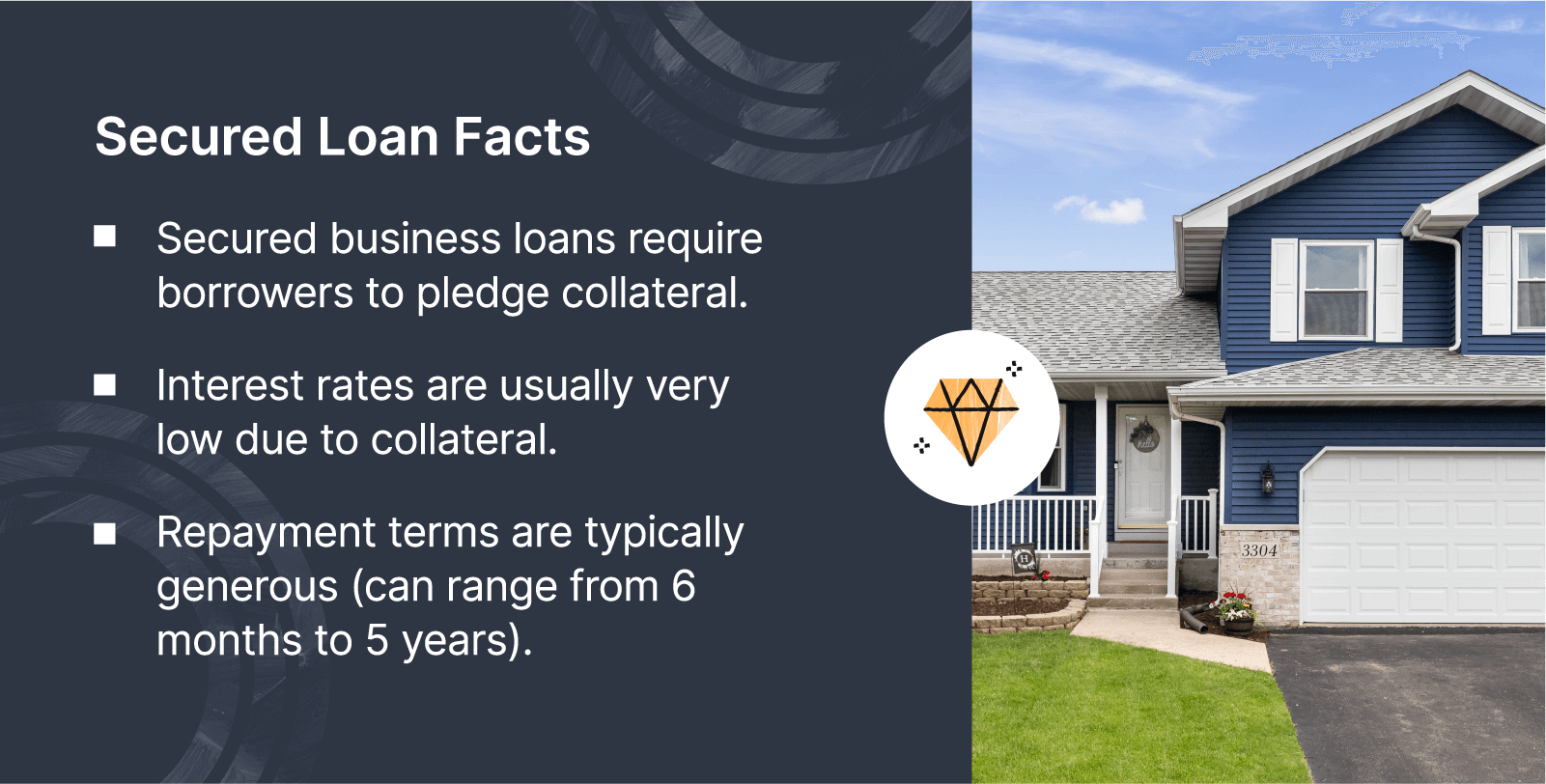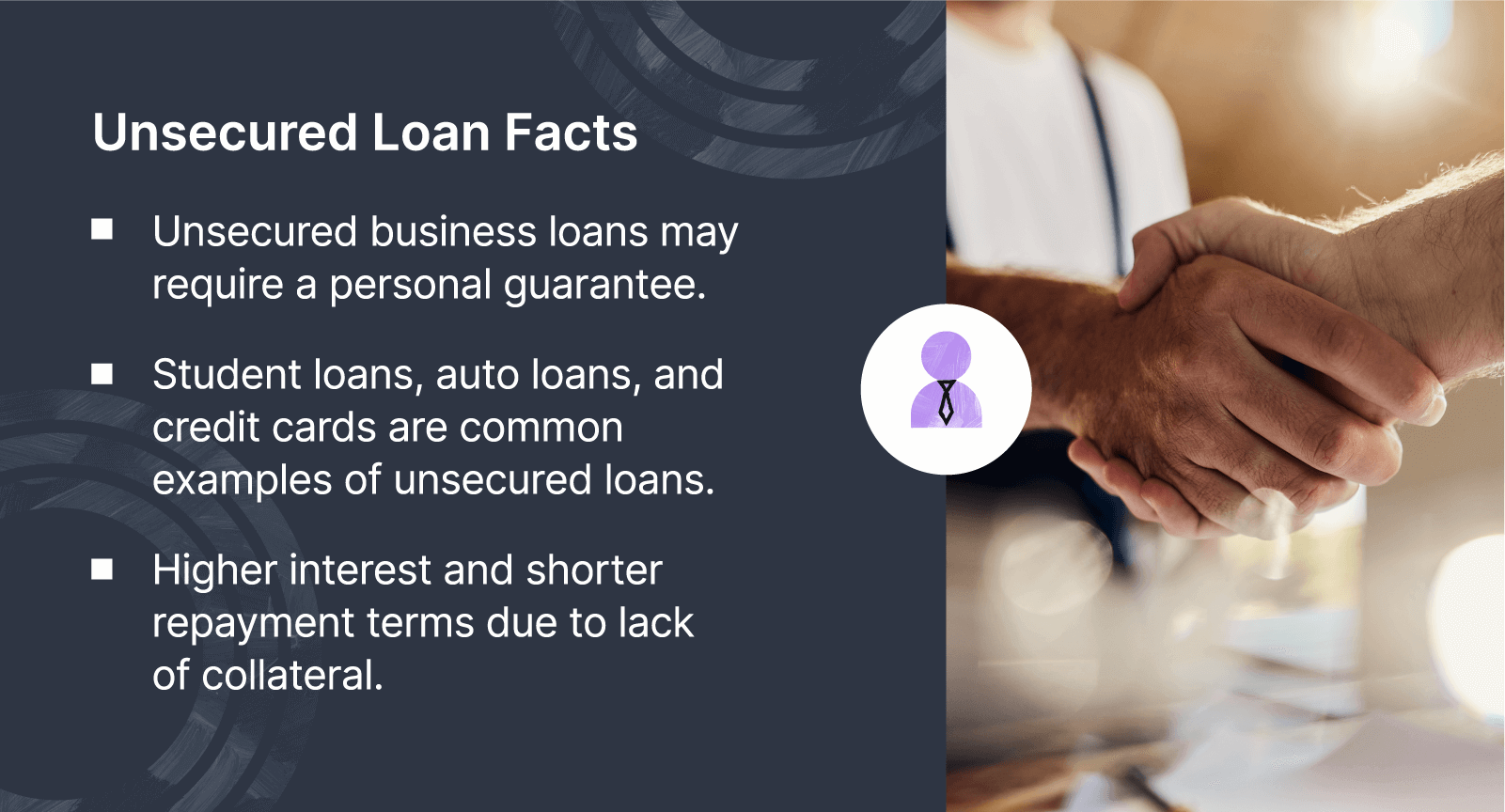Quick Answer:
When you sign a personal guarantee, you agree to be personally responsible for the debt if your company can't pay.
“Is a small business loan secured or unsecured?” In some respects, that's a bit of a trick question. It's possible to find secured and unsecured small business loans, depending on where you look. The main difference between the two is that one requires you to use collateral as security for the loan, and the other doesn't.
Both loans benefit small business owners, but loan amount, interest rate, and repayment terms can significantly vary between the two. Learn the advantages and drawbacks of secured and unsecured business loans — and discover how Clarify Capital can help you find the right funding for your operating needs.
Key Takeaways:
It's possible to find secured and unsecured small business loans.
Secured loans require collateral, while unsecured loans don't require collateral but usually have high interest rates.
Secured loans normally have longer repayment terms than unsecured loans.
What Is a Secured Business Loan?

Secured small business loans offer collateral-backed financing, which can come in the form of business assets, like commercial real estate, vehicles, equipment, accounts receivable, or inventory.
Business owners may also pledge personal assets to secure a loan. Some common forms of collateral include:
An entrepreneur's home or car
Financial assets like stocks and bonds
Rare jewelry or other valuable possessions
With a secured loan, the borrower gives the lender a legal claim to whatever assets they used to collateralize a loan. If the borrower defaults on the loan, the lender can seize the assets as payment.
Collateral decreases the risk of a substantial financial loss for the lenders. That's why secured loans typically have lower interest rates and longer repayment terms than unsecured loans. Lenders know that borrowers with assets on the line are more likely to pay back their loans.
Business owners usually take out secured loans to keep up with demand or when they need to purchase more inventory or hire additional employees. Loans also help entrepreneurs with equipment financing to increase their production. Other times, small business owners may borrow capital to expand their operations to a new location.
Examples of Secured Loans
You can apply for secured business loans through traditional banks, credit unions, and online lenders. These types of loans come in different forms, including:
Expand your search and compare loans and lenders to find the best solution available for your financing needs.
What Is an Unsecured Business Loan?

An unsecured business loan (also known as a no-collateral business loan) doesn't require borrowers to pledge an asset to secure the loan. This type of loan puts more risk on the lender, which may lead to higher interest rates and shorter repayment periods.
Traditional financial institutions and alternative lenders offer unsecured loans. Some factors that qualify business owners for unsecured loans are:
Credit risk (or your business credit score)
Your company's total time in business
Annual or monthly revenue
Online lenders have less strict eligibility requirements than traditional banks. For instance, online lenders may require a company to operate for at least six months, while banks might ask for at least two years.
In an unsecured loan contract, lenders may ask business owners to sign a personal guarantee or a UCC (Uniform Commercial Code) lien to lessen their risk. When you sign a personal guarantee, you agree to be personally responsible for the debt if your company can't pay.
It also gives the lender the right to take possession of your personal assets as payment for the unpaid portion of the debt.
Examples of Unsecured Loans
Unsecured loans come in many forms, which you may have already encountered in college or health care facilities. Some of the most common unsecured loans are:
Credit cards offered by commercial banks
Federal and private student loans
Medical loans to cover operating expenses
Depending on the contract, the creditor may file a lien on specific collateral, or it may file a blanket lien. A blanket lien gives the lender the right to seize all business assets as payment in case the company defaults on the loan. So, read your loan agreement and understand the terms before signing.
When Personal Guarantees Still Put Your Assets at Risk
Even with unsecured business loans, lenders may still require a personal guarantee. This means you'll be personally liable for repayment if your business defaults, even if no collateral was put up.
In some cases, a lender can pursue your personal assets, including your home or savings, if the debt goes unpaid. These terms are outlined in your loan agreement, so review it carefully before signing.
This structure gives lenders a fallback option when borrowers don't qualify for traditional secured business loans, especially for startups or those with limited credit history.
Secured vs. Unsecured Small Business Loans

Whether you're thinking of applying for a secured loan or if an unsecured business loan sounds more appealing, it's important to see how both types of funding compare and contrast with one another.
Secured Business Loans
As with most financing options, secured business loans have benefits and disadvantages:
Pros:
You can borrow higher loan amounts.
Secured business loans provide access to lower interest rates.
They may come with longer repayment terms.
You have the flexibility to use personal or business assets as collateral.
You won't need a guarantor.
They can be easier to qualify for.
They offer a way for business owners with poor credit scores to borrow capital.
Cons:
You could lose your collateral if you miss payments.
The application process takes longer because lenders may need to appraise the assets used for collateral.
Unsecured Business Loans
Here are a few advantages and drawbacks of unsecured small business loans:
Pros:
The loan application process is typically easier and quicker than other types of financing.
You don't have to put up collateral to borrow capital.
Your personal or business property isn't at risk.
You can borrow smaller loan amounts.
Cons:
They tend to have higher interest rates.
They have shorter repayment terms.
The maximum amounts available to borrow are lower compared to unsecured loans.
It can be more difficult to qualify because the eligibility criteria are stricter.
Your approval may rely on having a good credit score or a high income.
Which Small Business Loan Is Better for Me?

The best loan option depends on your business needs and how well you match the requirements laid out by lenders.
Below are a few criteria you can use to consider whether you should take out a secured or unsecured loan:
What Loan Terms You're Okay With
To see if one financing option is better for your company than the other, run the numbers. First off, know how much you need to borrow and how much your business can afford to pay back. Then, research lenders and get information on available loan amounts, interest rates, and repayment terms for both secured and unsecured loans.
The Amount of Collateral You Can Offer
If you have assets to put up as collateral and are willing to do so, a secured loan might be right for you. You can take advantage of lower interest rates and longer repayment terms. Collateral also helps you get approved for a loan if you have a less-than-stellar credit history.
An unsecured loan might be the best option if you're a new business or startup and don't have assets to pledge as security but you have a strong personal credit score and cash flow.
How Quickly You Need the Loan
When deciding between secured loans and unsecured loans, you might also want to consider how fast you need the loan. Secured loans take longer to finalize because lenders might need to appraise the asset you want to put up as collateral. In addition, you'll need to prepare and present more documents.
However, if you need the cash immediately to cover working capital, you might opt for a short-term loan. In this case, unsecured loans could be the answer to getting the money into your business bank account quickly.
When To Choose Unsecured vs. Secured: Real Business Scenarios
Each type of business situation is different, and making the right financial decision is crucial. Here are three common examples to help you decide which loan type might work best:
Startup with strong credit but no assets. A tech startup with strong cash flow but no equipment might choose an unsecured business loan to cover payroll while awaiting its next funding round.
Established business purchasing equipment. A construction company might choose a secured business loan backed by the equipment itself, unlocking a lower interest rate and longer repayment terms.
Retail store covering seasonal payroll. A retail business managing working capital in Q4 might use an unsecured line of credit to bridge cash flow gaps without tying up collateral.
Find Great Small Business Loan Rates With Clarify Capital
Clarify Capital can help borrowers find excellent rates for secured and unsecured loans by connecting them with a network of over 75 lenders. Entrepreneurs can quickly apply for loans and receive funding in 24 hours.
FAQs About Secured and Unsecured Small Business Loans
Understanding the fine print of small business financing is key to making smart decisions. These frequently asked questions clarify common concerns about eligibility, collateral, repayment, and how secured vs. unsecured loans impact your financial strategy.
What Types of Collateral Can Secure a Small Business Loan?
Lenders typically accept business assets like equipment, inventory, accounts receivable, or real estate as collateral. In some cases, personal assets such as vehicles, savings, or even your home may be used to back a loan, especially if you're applying for a larger loan or have a limited credit history. The type of collateral accepted depends on the lender's risk tolerance and the value of your assets.
Do Unsecured Small Business Loans Affect Your Personal Credit?
Yes. Even though unsecured business loans don't require collateral, many still require a personal guarantee. If your business defaults on the loan, the lender may report missed payments to credit bureaus, which can negatively impact your personal credit score. That's why it's important to review all loan agreement terms before borrowing.
Can You Get an Unsecured Loan With Bad Credit?
It's possible, but more difficult. Some online lenders and alternative financial institutions may approve unsecured small business loans for borrowers with lower credit scores, especially if the business has strong cash flow or consistent monthly revenue. However, expect higher interest rates and shorter repayment periods. You may also need to provide additional documentation during the application process to prove your creditworthiness.
Is a Business Line of Credit Secured or Unsecured?
A business line of credit can be either secured or unsecured, depending on the lender and the borrower's profile. Secured lines of credit require you to pledge business assets, like inventory or receivables, as collateral. Unsecured lines of credit don't require collateral but may come with higher interest rates and lower borrowing limits. Both options offer flexible access to capital for short-term needs.
Are SBA Loans Secured or Unsecured?
Most SBA loans, including SBA 7(a) loans, are secured loans. The U.S. Small Business Administration typically requires collateral for loans over $25,000. However, if adequate collateral isn't available, the SBA won't automatically decline the loan. Instead, they evaluate other factors like your business plan, creditworthiness, and annual revenue. Some smaller SBA microloans may be available without collateral, but these usually offer lower loan amounts.

Michael Baynes
Co-founder, Clarify
Michael has over 15 years of experience in the business finance industry working directly with entrepreneurs. He co-founded Clarify Capital with the mission to cut through the noise in the finance industry by providing fast funding and clear answers. He holds dual degrees in Accounting and Finance from the Kelley School of Business at Indiana University. More about the Clarify team →
Related Posts





